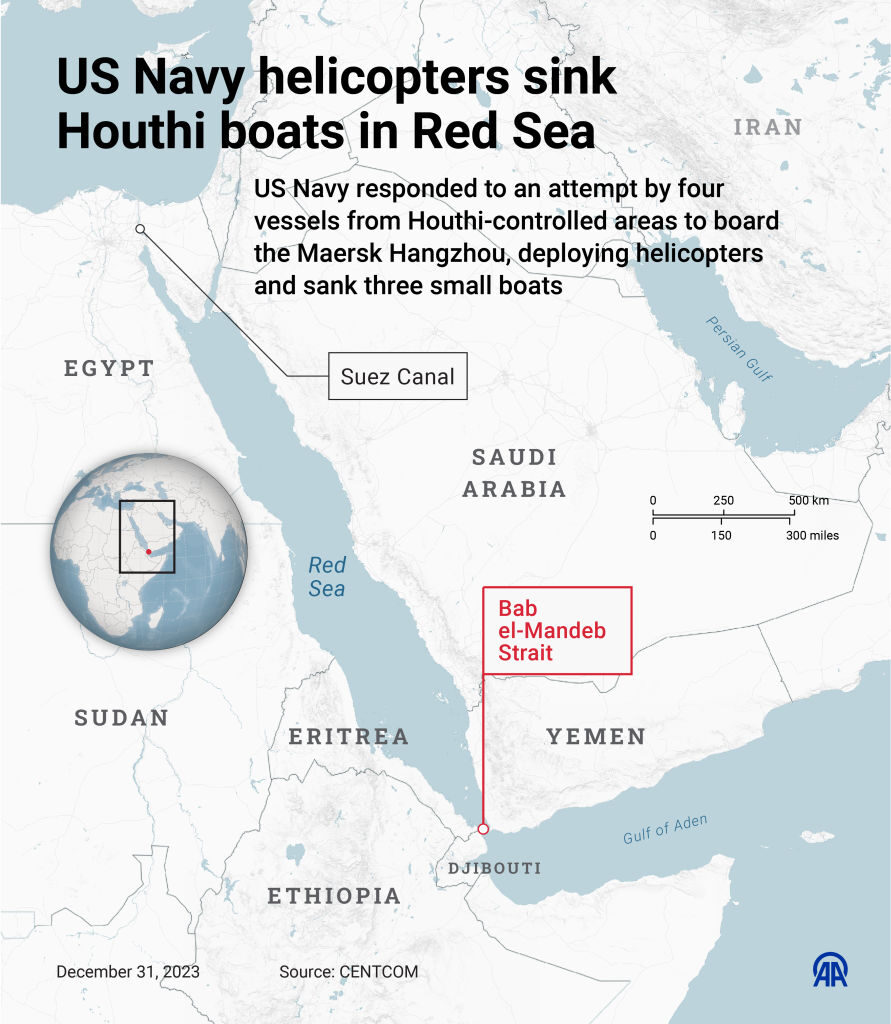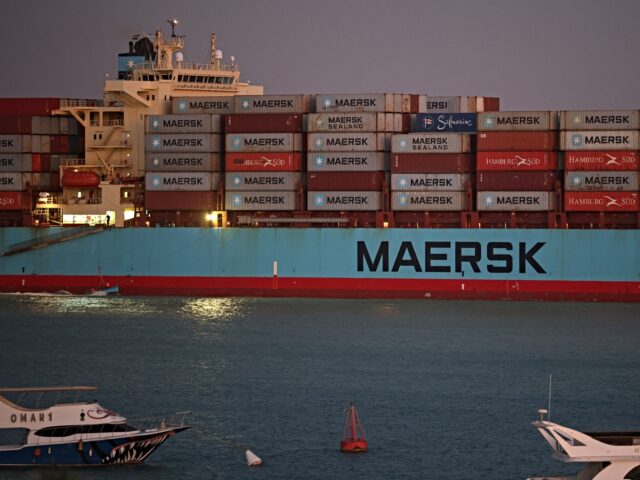Danish shipping giant Maersk suspended Red Sea shipping again on Sunday, calling a 48-hour pause to reconsider its plans for resuming Suez Canal routes after the Iran-backed Houthi terrorists of Yemen attacked one of its container ships.
U.S. military helicopters thwarted the boarding attempt, killing at least ten Houthis and sinking several of their boats.
The Houthis attacked a ship called the Maersk Hangzhou on Sunday, ostensibly because the ship refused to obey “warning calls” from the terrorists. Four small boats approached the container ship, loaded with Houthi fighters who opened fire with small arms and crew-served weapons. Private security contractors aboard the Maersk ship tried to keep the attackers at bay.
According to the U.S. Central Command (CENTCOM), the Maersk Hangzhou sent a distress call, which helicopters from two U.S. Navy warships – the aircraft carrier USS Dwight D. Eisenhower and the destroyer USS Gravely – answered.
The U.S. helicopters issued warnings to the Houthi terrorists, who responded by firing on the aircraft. The helicopters returned fire, sinking three of the boats and killing ten Houthis, according to a spokesman for the insurgency. The fourth boat fled the battle.
USS Gravely also intercepted two anti-ship ballistic missiles launched from Houthi territory in Yemen on Saturday after it responded to a distress call from the Maersk Hangzhou. The container ship reported being struck by a projectile but said it was “seaworthy” and suffered no casualties.

An infographic shows the U.S. Navy responded to an attempt by four vessels from Houthi-controlled areas to board the Maersk Hangzhou, deploying helicopters and sank three small boats. (Elmurod Usubaliev/Anadolu via Getty Images)
CENTCOM counted Saturday’s missile strike as “the 23rd illegal attack by the Houthis on international shipping since November 19,” which would make Sunday’s thwarted boarding action the 24th.
Maersk had scheduled over 30 container ships to use the Red Sea passage to the Suez Canal, but after suspending all Red Sea shipping for 48 hours on Sunday, the company said it would re-evaluate its plans.
Maersk was one of several large companies that stopped using the Red Sea in mid-December due to Houthi attacks, which are ostensibly an effort to punish Israel for fighting back against Hamas in Gaza. The Houthis are a Shiite jihadist terrorist organization located in Yemen, emboldened by the 2021 decision by the administration of President Joe Biden to remove them from the State Department’s list of Foreign Terrorist Organizations (FTOs).
Maersk’s decision to resume shipping was seen as a significant vote of confidence in “Operation Prosperity Guardian,” the Biden administration’s effort to cobble together a nebulous coalition of somewhere between ten and 20 nations to protect shipping from the Iran-supported Yemeni insurgents.
The Houthi attacks on Saturday and Sunday will likely be an equal blow to the confidence of commercial shipping operators. Oil prices rose two percent in post-holiday trading, due in part to concerns that Houthi attacks will create significant supply line disruptions during the peak demand season of Lunar New Year.
U.S. officials said the Gravely’s shootdown of two Houthi missiles brought the total number of Houthi weapons intercepted by Operation Prosperity Guardian to four missiles and 17 drones.
White House national security spokesman John Kirby said on Sunday that the Biden administration has “made it clear publicly to the Houthis, we’ve made it clear privately to our allies and partners in the region, that we take these threats seriously.”
“We don’t seek a conflict wider in the region and we’re not looking for a conflict with the Houthis. The best outcome here would be for the Houthis to stop these attacks, as we have made clear over and over again,” Kirby said. He did not elaborate on the administration’s plans to respond to the latest Houthi provocation.
UK Defense Minister Grant Shapps issued a stronger warning on Sunday, saying his government is considering “direct action” against the Houthis to halt their attacks.
“The Houthis should be under no misunderstanding: We are committed to holding malign actors accountable for unlawful seizures and attacks,” Shapps wrote in an op-ed for the UK Daily Telegraph.
Shapps noted the Houthi attacks on shipping “put innocent sailors’ lives at risk, exacerbate the humanitarian suffering in Yemen, and are destabilizing the wider region.”
The Iranian destroyer Alborz entered the Red Sea through the Bab el-Mandeb Strait on Monday, potentially adding more tension to an already volatile situation.
A Houthi representative visited Tehran on Monday for talks with Iranian leaders, while Iranian Foreign Minister Hossein Amirabdollahian slammed Western powers for attempting to protect shipping from the Houthis’ righteous attacks.
“Israel can’t be allowed to massacre women and children and carry out a genocide in Gaza and set fire to the region, but consider stopping an Israeli ship in the Red Sea as endangering the security of this economic waterway,” Amirabdollahian said.

COMMENTS
Please let us know if you're having issues with commenting.